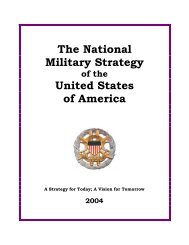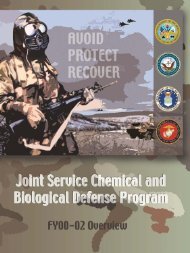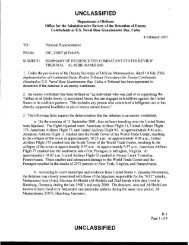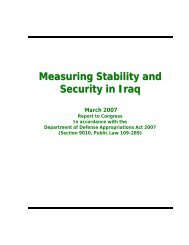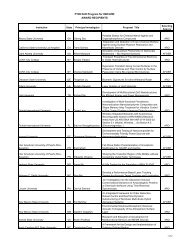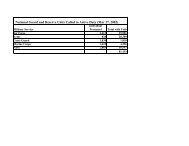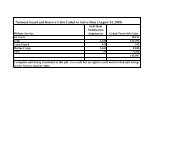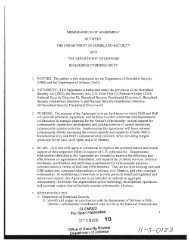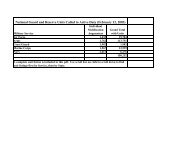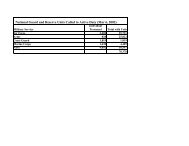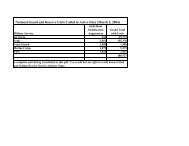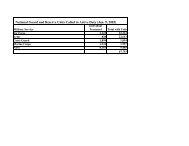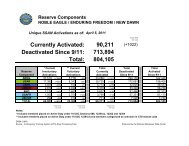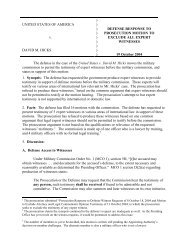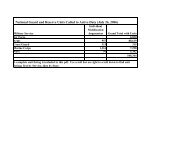Report - United States Department of Defense
Report - United States Department of Defense
Report - United States Department of Defense
You also want an ePaper? Increase the reach of your titles
YUMPU automatically turns print PDFs into web optimized ePapers that Google loves.
UNCLASSIFIED<br />
Despite the complex cultural and logistical challenges associated with better integrating women<br />
into the ANSF, there has been incremental progress regarding the role <strong>of</strong> women within the<br />
police and the armed forces. Some <strong>of</strong> the success witnessed in the past decade surpasses that <strong>of</strong><br />
other countries in the region. As a result <strong>of</strong> this effort, gender training is now in place across<br />
much <strong>of</strong> the ANSF, harassment and violence against women are being addressed, educational<br />
projects for women are being established, and political will is present in certain areas. Gender<br />
integration policies exist in both the MoD and MoI, but need improved implementation. Support<br />
from ANSF leadership is essential to improving the recruitment and treatment <strong>of</strong> women in the<br />
ANSF.<br />
Many challenges remain, however. The recruitment and retention <strong>of</strong> women remain difficult; the<br />
primary obstacle is likely family-related issues. Other impediments to sustainment have been<br />
identified, such as a lack <strong>of</strong> challenging assignments upon graduation, accounts <strong>of</strong> sexual<br />
harassment and violence, and difficulties concerning separate housing and bathing facilities.<br />
Recruitment <strong>of</strong> women for the ANA, AAF, and ANP continues to fall short <strong>of</strong> the MoD and MoI<br />
female recruitment goals <strong>of</strong> 10 percent <strong>of</strong> the ANA and AAF, and 5,000 for the ANP. NTM-A<br />
consistently promotes female recruitment and gender integration in its interactions with the<br />
ANSF. Despite this, gender integration has been slow to take effect. The MoI is continuing<br />
Gender and Human Rights training and Ending Violence Against Women (EVAW) programs.<br />
The MoI Ten-Year Vision incorporates Gender and Human Rights to gain the trust <strong>of</strong> local<br />
communities.<br />
Cultural perceptions <strong>of</strong> Afghan females serving in the ANSF can still be problematic. Women<br />
can play a key role in establishing trust between community and police. The Police Pillars are<br />
using known “celebrity” voices in Afghan culture to promote the image <strong>of</strong> the ANP as being an<br />
employer <strong>of</strong> choice for Afghan women and their families. Although great strides have not been<br />
evident in the recruitment <strong>of</strong> women into the ANP, the deputy Minister for Administration has<br />
announced that he will host a Gender Recruiting Strategy Conference in spring 2013 to garner<br />
support from the religious leaders who are highly influential in the community.<br />
To help increase the recruitment <strong>of</strong> women into the ANA, and to help safeguard women’s rights,<br />
the MoD, with assistance from NTM-A, has begun to stand up the Directorate <strong>of</strong> Human Rights<br />
and Gender Integration (HR&GI). The MoD had assigned a major general as the director and an<br />
AAF colonel to the deputy position; both are actively working to increase the Directorate’s<br />
tashkil from five to 36 positions. In a positive sign, the number <strong>of</strong> women taking the test for<br />
acceptance into the National Military Academy <strong>of</strong> Afghanistan (NMAA) increased from 47 to<br />
97. Of particular note, MoI conducted a recruiting campaign for SOF and received 34 female<br />
applicants, <strong>of</strong> whom seven were accepted.<br />
The recruitment and retention <strong>of</strong> women in the ANA and ANP is an element <strong>of</strong> the U.S.-<br />
Afghanistan Bilateral Commission’s Democracy and Shared Values Working Group. Progress<br />
on this issue was addressed by the U.S. State <strong>Department</strong>’s Assistant Secretary <strong>of</strong> State for<br />
Democracy, Human Rights, and Labor Michael Posner and Deputy Assistant Secretary Jane<br />
Zimmerman in working group meetings in Kabul in February and May <strong>of</strong> 2013. The Embassy<br />
regularly engages the Afghan Ministry <strong>of</strong> Foreign Affairs, MOI, and MOD on this issue.<br />
117



